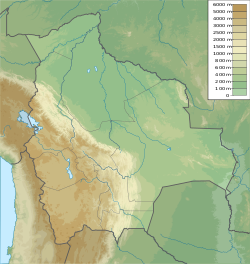Cancañiri Formation
| Cancañiri Formation | |
|---|---|
| Stratigraphic range: Katian-Hirnantian ~ | |
| Type | Geological formation |
| Underlies | Uncía Formation |
| Overlies | Amutara & San Benito Formations |
| Thickness | Up to 1,500 m (4,900 ft) |
| Lithology | |
| Primary | Sandstone, shale |
| Other | Siltstone |
| Location | |
| Coordinates | 17°42′S 66°18′W / 17.7°S 66.3°W |
| Approximate paleocoordinates | 44°12′S 127°24′W / 44.2°S 127.4°W |
| Region | Cochabamba & Potosí Departments |
| Country | |
| Extent | Cordillera Oriental |
| Type section | |
| Named for | Cancañiri |
The Cancañiri Formation, also named as Cancañiri Tillite, is a Katian to Hirnantian geologic formation of central Bolivia. The pebbly, argillaceous sandstones, shales and siltstones of the up to 1,500 metres (4,900 ft) thick formation,[1] were deposited in a glacial foreshore to deep water turbiditic environment.[2][3][4][5] The formation is named after Cancañiri, a mining town close to Llallagua, where a local legend of a possessed woman is believed.[6] The formation overlies the San Benito Formation in Cochabamba and the Amutara Formation in other parts. The Cancañiri Formation is overlain by the Uncía Formation.[7]
Fossil content[edit]
The formation has provided the following fossils:
See also[edit]
References[edit]
- ^ Díaz Martínez, 2005, p.237
- ^ Díaz Martínez, 1997, p.55
- ^ Along "Coboce" Road near Irpa Irpa Railway Station at Fossilworks.org
- ^ Changolla, railway on the Cochabamba - Oruro Railway at Fossilworks.org
- ^ Paco Chico, ~40 km west of Potosí at Fossilworks.org
- ^ La Llorona de Cancañiri
- ^ Díaz Martínez, 1997, p.56
Bibliography[edit]
- Díaz Martínez, E. 2005. Procedencia y edad de las diamictitas del Paleozoico inferior de la cuenca de Perú-Bolivia (Gondwana occidental) - Provenance and age of diamictites in the lower Palaeozoic of the Peru-Bolivia basin (western Gondwana). Geogaceta 38. 235–238. Accessed 2019-03-03.
- Díaz Martínez, E. 1997. Facies y ambientes sedimentarias de la Formación Cancañiri (Silúrico inferior) en La Cumbre de La Paz, norte de la Cordillera Oriental de Bolivia. Geogaceta 22. 55–57. Accessed 2019-03-03.
Further reading[edit]
- V. Havlicek and L. Branisa. 1980. Ordovician brachiopods of Bolivia: Succession of assemblages, climate control, affinity to Anglo-French and Bohemian provinces. Rozpravy Ceskoslovenske Akademie Ved. Rada Matematickych a Prirodnich Ved. Academia Praha, Prague, Czechoslovakia 90(1):1-54
Categories:
- Geologic formations of Bolivia
- Ordovician System of South America
- Silurian System of South America
- Ordovician Bolivia
- Silurian Bolivia
- Katian
- Hirnantian
- Sandstone formations
- Shale formations
- Siltstone formations
- Glacial deposits
- Deep marine deposits
- Turbidite deposits
- Ordovician southern paleotemperate deposits
- Silurian southern paleotemperate deposits
- Paleontology in Bolivia
- Geology of Cochabamba Department
- Geology of Potosí Department

